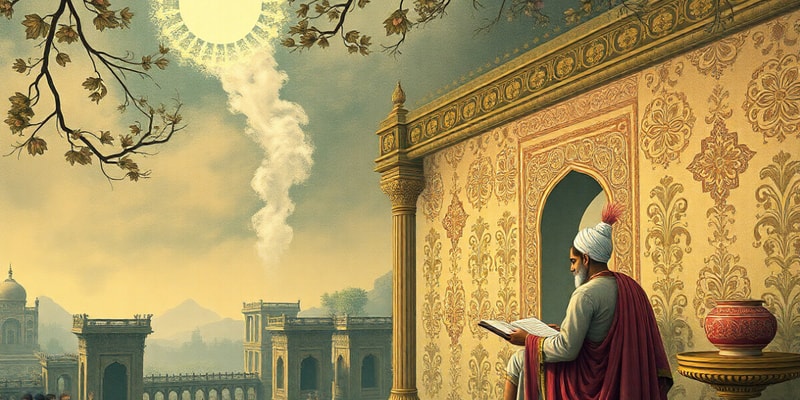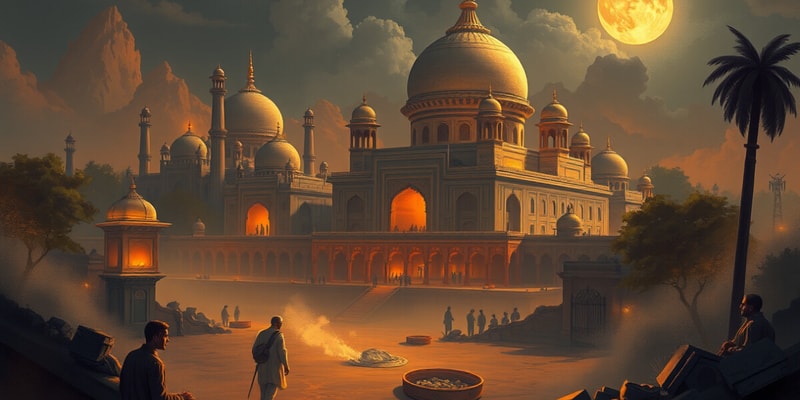Podcast Beta
Questions and Answers
What was the primary concern regarding territorial redistribution highlighted by the Simon Commission in relation to Punjab, Bengal, and NWFP?
Any territorial redistribution must not affect the Muslim majority in Punjab, Bengal, and NWFP.
Why did the Muslim League and the Hindu Mahasabha find the Nehru Report unsatisfactory?
They were unhappy with the dominion status proposed in the report and the lack of separate electorates for Muslims.
What was the significance of the separation of Sindh from Bombay as proposed in the Nehru Report?
The separation of Sindh aimed to address the distinct cultural and administrative needs of the region.
What was the significance of the Nehru Report in the context of Indian constitutional development?
Signup and view all the answers
How did the Nehru Report address the issue of electorates for Muslims?
Signup and view all the answers
How did Nehru and Subhash Bose respond to the modified goal of Congress regarding dominion status?
Signup and view all the answers
Describe the differing views within the Nehru Committee regarding the constitutional basis for India.
Signup and view all the answers
What were the main elements of the constitutional reforms proposed by the Simon Commission?
Signup and view all the answers
What recommendation did the Nehru Report make regarding the formation of provinces?
Signup and view all the answers
Discuss the role of Motilal Nehru in the formulation of the Nehru Report.
Signup and view all the answers
What were the main objections raised by the Hindu Mahasabha regarding the Simon Commission's proposals?
Signup and view all the answers
How did the Nehru Report attempt to address Muslim representation in legislative assemblies?
Signup and view all the answers
In what way did the All Parties Conference reveal the challenges faced by Muslim League leaders?
Signup and view all the answers
What concessions did the Nehru Report make to Hindu communalists regarding provincial representations?
Signup and view all the answers
What were the proposed new Muslim majority provinces according to the Simon Commission's recommendations?
Signup and view all the answers
What role did youth organizations play in the protest against the Simon Commission?
Signup and view all the answers
How did Lala Lajpat Rai's injuries during the protests affect the perception of British rule?
Signup and view all the answers
Identify two leaders who emerged from the youth movement during the protests against the Simon Commission.
Signup and view all the answers
What was one significant outcome of the Simon Commission for the Indian National Congress?
Signup and view all the answers
How did the police respond to the protests against the Simon Commission?
Signup and view all the answers
What was the reaction of Indian politicians to Lord Birkenhead's challenge regarding the constitution?
Signup and view all the answers
What impact did the rise of radical forces have on the National Movement following the Simon Commission's announcement?
Signup and view all the answers
What were the primary reasons for the establishment of the Simon Commission in 1927?
Signup and view all the answers
What was the composition of the Simon Commission, and why was it significant?
Signup and view all the answers
How did the establishment of the Simon Commission reflect British political concerns in the late 1920s?
Signup and view all the answers
Explain the role of previous commissions, like the Lee and Linlithgow Commissions, in the context of the Simon Commission's formation.
Signup and view all the answers
In what way did the concerns over the Labour Party's policies influence the British government's decision regarding the Simon Commission?
Signup and view all the answers
What critique did Indian leaders raise regarding the Simon Commission upon its announcement?
Signup and view all the answers
How did the Simon Commission's formation impact the Indian National Congress and its strategies?
Signup and view all the answers
What was the broader historical context surrounding the establishment of the Simon Commission in relation to constitutional reforms in India?
Signup and view all the answers
Discuss how the British government's fear of losing colonial control influenced the timing of the Simon Commission's establishment.
Signup and view all the answers
What are the tenures for the House of Representatives and the Senate in the Indian Parliament?
Signup and view all the answers
What role does the governor-general play in the Indian government structure?
Signup and view all the answers
What specific cultural protections are guaranteed to Muslims under the modern Indian government framework?
Signup and view all the answers
What significance did the Delhi Proposals have in the constitutional development of India?
Signup and view all the answers
How does the Indian Parliament ensure the representation of various communities?
Signup and view all the answers
What was the primary demand of the Muslim League at the Delhi session in December 1927?
Signup and view all the answers
What does 'complete dissociation of State from religion' imply in the context of modern India?
Signup and view all the answers
What structure comprises the Indian Parliament and who elects its members?
Signup and view all the answers
Why is the idea of 'equal rights for women' significant in the context of the Fundamental Rights outlined?
Signup and view all the answers
Study Notes
The Nehru Report (1928)
- The Nehru Report was a significant first attempt by Indians to draft a constitutional framework for the country.
- The report was drafted by a sub-committee led by Motilal Nehru in response to Lord Birkenhead's challenge for Indians to propose a constitution.
- The report primarily focused on British India, envisioning a future federal structure including princely states.
- The report advocated for Dominion status, with self-governing dominions as the desired model for India.
- It rejected separate electorates and advocated for joint electorates with reserved seats for Muslims in provinces where they were a minority.
- The report also recommended linguistic provinces and outlined 19 fundamental rights.
The Simon Commission (1928)
- The Simon Commission was an all-white commission appointed by the British government in 1927 to explore the possibility of further constitutional reforms in India.
- The commission faced widespread protests and boycotts from Indians due to the exclusion of Indian representation.
- The commission's report was published in 1930, proposing abolition of dyarchy, establishment of representative government in provinces with autonomy, and retention of separate communal electorates.
- The report rejected parliamentary responsibility at the center and suggested a Consultative Council of Greater India, incorporating representatives from British provinces and princely states.
Communal Tensions and the Nehru Report
- The Nehru Report faced criticism from various groups, including the Muslim League, Hindu Mahasabha, and the younger faction of the Congress led by Jawaharlal Nehru and Subhash Bose.
- The Muslim League, Hindu Mahasabha, and Sikh communalists were unhappy with the report's proposals, particularly regarding reservations for Muslims and the creation of new Muslim-majority provinces.
- The younger Congress faction criticized the report's focus on dominion status, viewing it as a step backward from complete independence.
Dr. Ambedkar and the Simon Commission
- Dr. Ambedkar was appointed by the Bombay Legislative Council to work with the Simon Commission.
- He advocated for universal adult franchise, provincial autonomy, and safeguards for the depressed classes.
- He submitted a memorandum to the Bahishkrita Hitakarini Sabha detailing the rights required for the depressed classes.
- He believed the depressed classes required greater political protection due to educational backwardness, economic poverty, social enslavement, and political disabilities.
- Dr. Ambedkar was dissatisfied with the Simon Commission's report, which granted reserved seats but imposed conditions on candidates.
The Impact of the Simon Commission on the National Movement
- The appointment of the all-white Simon Commission fueled radical forces demanding complete independence and socio-economic reforms on socialist lines.
- It provided a platform for the Congress to mobilize mass action and reiterate its demand for independence.
- The Simon Commission's arrival further escalated communal tensions and highlighted the need for a concrete constitutional framework based on Indian aspirations.
Studying That Suits You
Use AI to generate personalized quizzes and flashcards to suit your learning preferences.
Description
This quiz covers the Nehru Report and the Simon Commission, two pivotal moments in India's constitutional history during the late 1920s. It explores the proposals made by Indian leaders for self-governance and the response to British authority. Test your knowledge of these significant historical events and their impact on India's path to independence.




